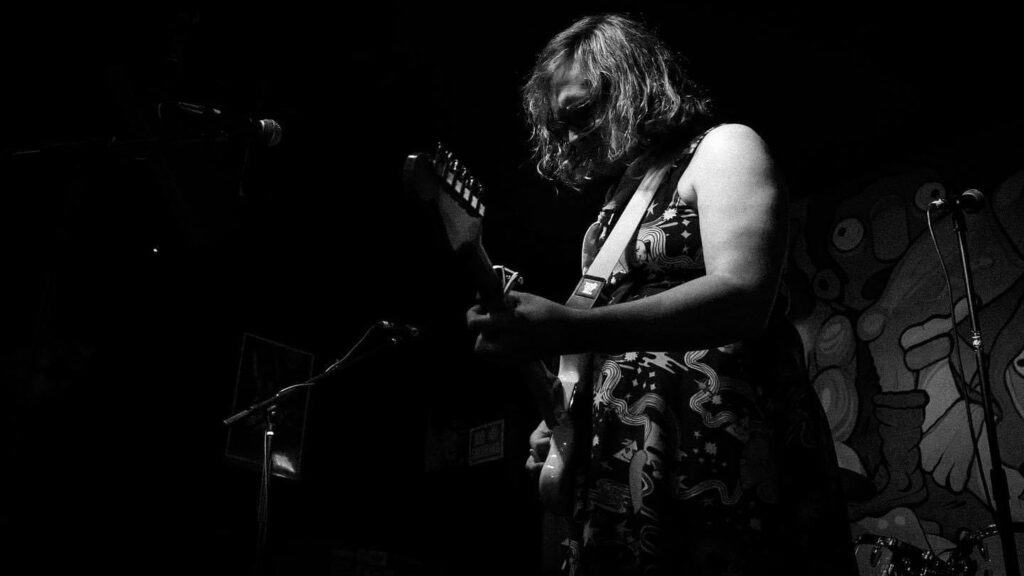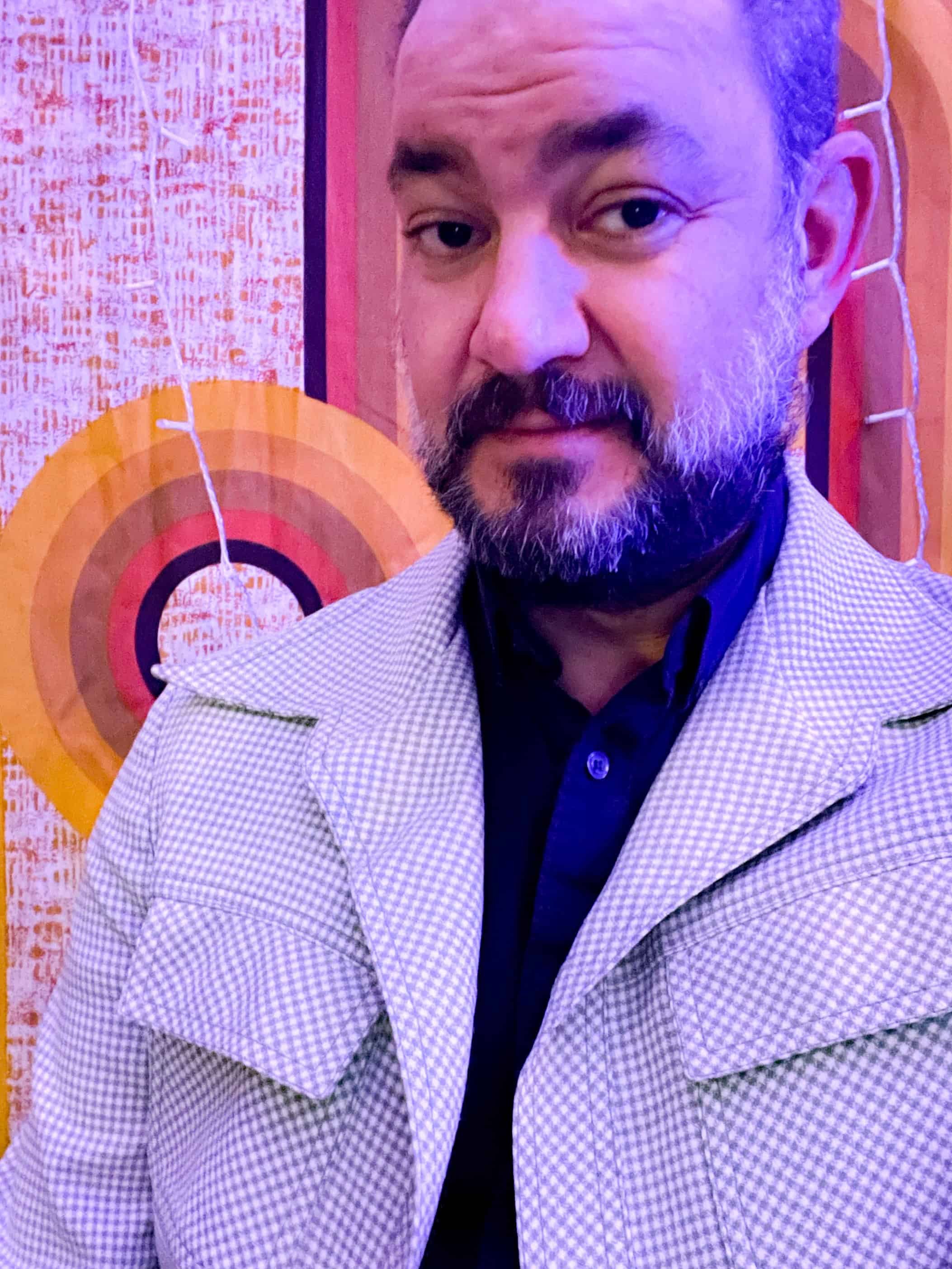Maggie Of Mystic Light Casino Is Trans, Proud, And Rocking Memphis

|||
"Maggie, who calls herself “Iggy Pop in a sports bra,” recently fronted the band at the inaugural Women in Memphis Music Festival alongside some of the city's most dazzling talent."
By Aaron Brame (WP NEEDS TO BE ADDED HERE)
Maggie Trisler is the creative force behind Mystic Light Casino, a powerful band from Memphis, Tennessee with a lo-fi aesthetic that takes its cues from punk heroes like The Stooges and Sleater-Kinney. Maggie, who calls herself “Iggy Pop in a sports bra,” recently fronted the band at the inaugural Women in Memphis Music Festival alongside some of the city’s most dazzling talent.
In Tennessee, simply performing at this event is perilous for a trans musician like Maggie. The Republican-led legislature has led a crusade against trans individuals in this state, passing the first-ever law that placed legal limits on drag shows on public property or—as in the case of the all-ages Women in Memphis Music Festival—any event without age restrictions.
This law—which was struck down as unconstitutionally vague by a federal judge—could have classified an artist such as Maggie as a “male or female impersonator,” and therefore legally a cabaret performer engaged in a criminal act. Even with the law gone, a host of predatory state laws against trans people in Tennessee went into effect in July, and the threat against trans performers of all kinds is palpable.
Trisler, 40, has been part of the Memphis underground music scene for 12 years but has discovered new possibilities for self-expression since transitioning in March of 2018. TransLash interviewed Trisler on her evolution not just as a trans woman, but also as an artist and an introvert.
When I first started playing as a teenager, I created a caricature of myself to perform because I’m a shy person. Creating a version of myself with a lot more confidence helped me do this thing I wanted to do—write and perform songs.
I started this band in 2015, before I was even out as trans to myself. Most of the bandmates have treated me the same. They’ve all been very supportive, and even when they’ve made mistakes, it’s all been very well intended.
I started transitioning around 2017, and for the next couple years I played a few shows fairly normally. I was out, but not terribly out. Then I played a few shows wearing dresses—people thought it was kind of like a gimmick at first until we had conversations after the set. Then when I got laid off from my day job at the start of the pandemic, I went full-time as Maggie.
As restrictions lifted, I got the band back together and we started playing shows again in late 2021, I just decided that I was going to be aggressively assertive about my femininity.
I’m not the most passing trans woman, and I don’t really care to be. It’s not my goal. My goal is to get people to read me correctly duringin interpersonal interactions. I am best understood as a woman—always have been, and always will be. Transitioning was more about that.
My mission today is just to be who I am. Asserting myself—my real self this time—not a caricatur
Maggie’s band, Mystic Light Casino, has a new sound now, developed through the voice feminization lessons she took to change her speaking and singing style. She hopes to record a new EP with the band later this summer.
Hormone replacement therapy can’t undo the damage that testosterone does to your vocal cords, so if I hadn’t gone through [those lessons] then I wouldn’t have been able to talk to you the way that I’m talking right now.
The switch does flip when I get on stage. I still get really horrible stage fright even if there’s two people in the audience. Honestly, that’s worse. If there’s two people in the audience I get more nervous, and my anxiety gets ramped up, but the second I get on stage, all that energy that builds up gets put into the performance.
And part of that is playing with that notion and how to perform and just to be who I am and do what I do.

While Trisler has found a supportive community in her home of Memphis, the state legislature of Tennessee and its mayor, Bill Lee, have passed increasingly hostile legislation against the trans population.
Whereas drag is an exaggerated performance of gender, part of my transition was an exaggerated performance of myself, but in a way, it’s more vulnerable than I know how to do in real life—which is why I’m single.
I am aware of the fact that Tennessee state law defines me as a drag queen or a drag performer when what I’m doing is very much not that. So now I’m interested in walking right up to that line and playing up where that line is for me as a protest, but also as a way of expanding my ability to express myself.
I’m looking at booking a tour for later this year, and that’s becoming scarier. I do have lots of queer friends in lots of towns across the country (thank God for the internet!). I can connect with them and see where they would play, but there’s still a few gaps in the map I have in my head. I’m like “I don’t think I want to drive quite that far. I don’t know if I want to stop in any of the cities between here and there.” So how do I figure that one out?
Trisler recently had an opportunity to be an example that she needed for herself when she was a young punk rocker trying to understand her own identity.
I got to play a Pridefest in Jonesboro a couple of weeks ago and did have younger kids come up to me afterward and say they had never seen a queer person perform anything but drag and didn’t know that that was something that they could do. Just perform their regular creative work in a different context.
When I was a kid I didn’t have the chance of seeing queer people just being queer people and performing. I didn’t have the experience of seeing a trans person do anything but drag, and it’s kind of on me to be the example that I wanted to see.
Featured photo courtesy of Aaron Brame. It took me until I was 36 and met [late Memphis trans icon and entertainer] Lisa Michaels, dearly missed Lisa Michaels, doing a stand-up bit about being a trans lesbian for me to realize that “Oh, wait, I can be a girl and like girls? I did not know that.” My mind was blown.
And now I’m a cranky 40-year-old trans lesbian wearing flashy clothes. But rock and roll flashy! I mean, I have gold lamé pants now.
I look trans. I don’t care. I like the way I look. I like the way I feel. I like the way I am.
Featured photo courtesy of Aaron Brame.

Aaron Brame is a journalist, educator, and poet living in Memphis, Tennessee.